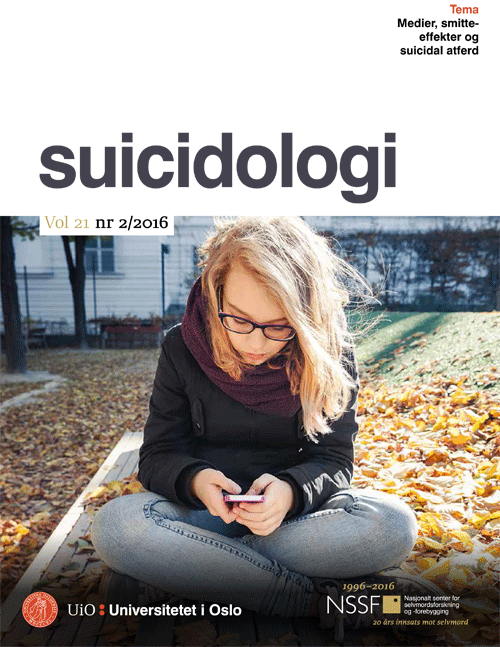Hva kjennetegner europeiske barn som har erfaring med nettsider hvor folk diskuterer måter å ta sitt eget liv på?
DOI:
https://doi.org/10.5617/suicidologi.3892Abstract
I denne artikkelen ser vi på hva som kjennetegner barn og unge som
har erfaring med nettsteder hvor brukerne diskuterer måter å ta sitt
eget liv på. Vi gjør dette ved å analysere sammenhengen mellom
erfaringer med selvmordssider blant 11–16-åringer i 25 europeiske
land, og ser dette opp mot demografisk og nasjonal bakgrunn, bruk
av Internett, psykisk tilstand og erfaringer med mobbing. Her undersøker
vi både dem som blir mobbet og dem som mobber. Funnene
viser at kjønn, alder og bruk av Internett har sammenheng med
hvorvidt barn besøker selvmordssider. Funnene viser også at alle
variabler som måler psykisk helse, med unntak av mestringstro, korrelerer
med erfaringer med selvmordssider på Internett. Å bli mobbet
utenfor nettet øker ikke sannsynligheten for å besøke slike sider.
Det gjør derimot å bli mobbet på nettet. Det er også store forskjeller
mellom land. Konsekvenser for preventivt arbeid diskuteres.
References
Bronfenbrenner, Urie. (1979). The ecology of human development: Experiments by design and nature: Cambridge, MA: Harvard University Press.
Bronfenbrenner, Urie. (1986). Ecology of the family as a context for human development: Research perspectives. Developmental psychology, 22(6), 723.
d’Haenens, Leen, Vandoninck, Sofie, & Donoso, Verónica. (2013). How to cope and build online resilience? EU Kids Online, http://eprints.lse.ac.uk/48115/: London School of Economics and Political Science.
Goodman, Robert, Meltzer, Howard, & Bailey, Veira. (1998). The Strengths and Difficulties Questionnaire: A pilot study on the validity of the self-report version. European child & adolescent psychiatry, 7(3), 125-130. doi: 10.1007/s007870050057
Haddon, Leslie. (2015). Children’s critical evaluation of parental mediation. Cyberpsychology: Journal of Psychosocial Research on Cyberspace, 9(1), Article
doi: 10.5817/CP2015-1-2
Hasebrink, Uwe, Görzig, Anke, Haddon, Leslie, Kalmus, Veronika, Livingstone, Sonia, & and members of the EU Kids Online network. (2011). Patterns of risk
and safety online. In-depth analsyses from the EU Kids Online survey of 9- to 16- year-olds and their parents in 25 European Countries Eu Kids Online. http:// eprints.lse.ac.uk/39356/: London School of Economics and Political Science.
Helsper, Ellen, Kalmus, Veronika, Hasebrink, Uwe, Sagvari, Bence, & de Haan, Jos (2013). Country classification: opportunities, risks, harm and parental mediation
EU Kids Online. http://eprints.lse.ac.uk/52023/: London School of Economics and Political Science.
James, Allison, Jenks, Chris, & Prout, Alan. (1998). Theorizing childhood. Cambridge: Polity Press.
James, Allison, & Prout, Alan. (1990). Constructing and reconstructing childhood: contemporary issues in the sociological study of childhood. London: Falmer
Press.
Kirwil, Lucyna, Garmendia, Maialen, Garitaonadia, Carmelo, & Fernandez, Gemma Martinez. (2009). Parental mediation. I Sonia Livingstone & Leslie Haddon
(Red.), Kids online (s. 199-215). London: The Policy Press.
Livingstone, Sonia, Haddon, Leslie, Görzig, Anke, & Ólafsson, Kjartan (2011a). Risk and safety on the internet. The perspective of European children. Full findings from the EU Kids Online survey of 9-16 year olds and their parents EU Kids Online. http://eprints.lse.ac.uk/33731/: London School of Economics and Political Science.
Livingstone, Sonia, Haddon, Leslie, Görzig, Anke, & Ólafsson, Kjartan (2011b). Technical Report and User Guide: The 2010 EU Kids Online Survey. A report on
the design and implementation of the EU Kids Online survey of 9-16 year olds and their parents in 25 countries EU Kids Online. http://eprints.lse.ac.uk/45270/:
London School of Economics and Political Science.
Livingstone, Sonia, Mascheroni, Giovanna , Dreier, Michael, Chaudron, Stephane, & Lagae, Kaat. (2015). How parents of young children manage digital devices at home: the role of income, education and parental style EU Kids
Online. http://eprints.lse.ac.uk/63378/ London School of Economics and Political Science.
Livingstone, Sonia, Mascheroni, Giovanna, & Staksrud, Elisabeth (2015). Developing a framework for researching children’s online risk and opportunities in Europe EU Kids Online. http://eprints.lse.ac.uk/64470/ London School of Economics and Political Science.
Lobe, Bojana, Segers, Katia, & Tsaliki, Liza. (2009). The role of parental mediation in explaining cross-national experiences of risk. I Sonia Livingstone &
Leslie Haddon (Red.), Kids online (s. 173-183). London: The Policy Press.
Schramm, Wilbur, Lyle, Jack, & Parker, Edwin B. (1961). Television in the lives of our children: Stanford University Press.
Schwarzer, Ralf, & Jerusalem, Matthias. (1995). Optimistic self-beliefs as a resource factor in coping with stress. I Extreme stress and communities: Impact and intervention (s. 159-177): Springer.
Sonck, Nathalie, Livingstone, Sonia, Kuiper, Els, & de Haan, Jos. (2011). Digital literacy and safety skills EU Kids Online. http://eprints.lse.ac.uk/33733/: London School of Economics and Political Science.
Stephenson, Michael T, Hoyle, Rick H, Palmgreen, Philip, & Slater, Michael D. (2003). Brief measures of sensation seeking for screening and large-scale surveys. Drug and alcohol dependence, 72(3), 279-286. doi: 10.1016/j.drugalcdep. 2003.08.003
Downloads
Issue
Section
License
Authors who publish with this journal agree to the following terms:
- Authors retain copyright in accordance with the Norwegian Copyright Act (link in Norwegian), and grant Suicidologi right of first publication with the work.
- Authors are able to enter into separate, additional contractual arrangements for the non-exclusive distribution of the journal's published version of the work (e.g. post it to an institutional repository), with an acknowledgement of its initial publication in this journal.
- Readers of Suicidologi may only use the journal's content in accordance with the Norwegian Copyright Act.


